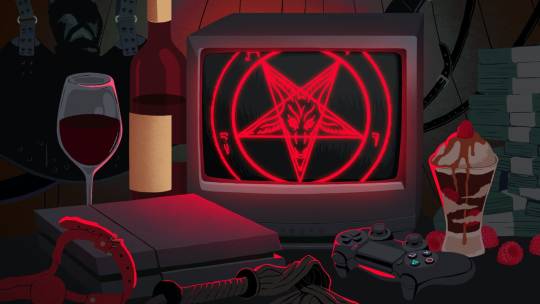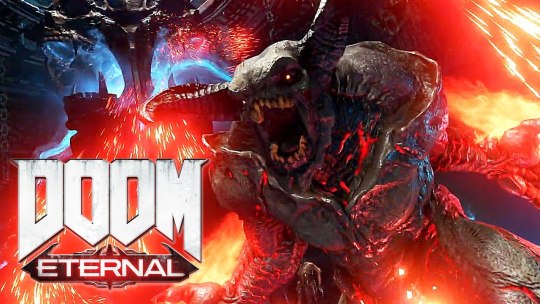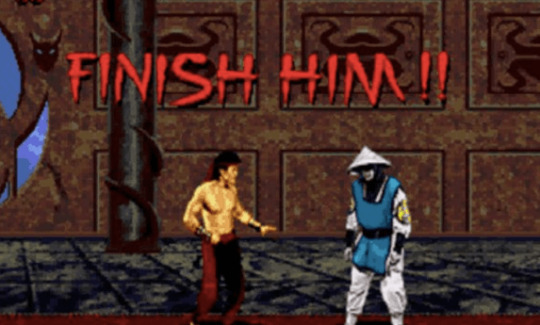#also is her name bayonetta or is that just what the game is called.... ive never played the games
Explore tagged Tumblr posts
Text
holy shit bayonetta is 8ft tall
#txt#howd i guestimate that so good#also is her name bayonetta or is that just what the game is called.... ive never played the games#my only real bayonetta adjacent exposure is my mutuals and oboeshoesgames bullet witch playthrough
2 notes
·
View notes
Text
Video Games Might be a Little Satanic
Susan Brinkmann of Philadelphia’s The Bulletin would like you to know that video games are, more and more, skewing towards the satanic and are waging a war against God… or… something. According to Brinkmann, even the “hardcore” crowd is starting to become concerned by the increasing levels of anti-religious sentiment in modern video games.

Even the most hard-core gamers are sounding the alarm about the rise in the number of satanically-themed video games that target God and Christianity, invite players to make pacts with the devil, and elevate Satan to hero status.
“This has been going on for the last 10 years, but especially in the most recent games,” said Lance Christian, 32, of Alton, Illinois who has been an avid gamer for most of his life.
Basically Mr. Christian and, by extension, Mrs. Brinkmann are arguing that the video game industry has become increasingly friendly towards Mr. Beelz.
Brinkmann cites several games to support her argument (and provided by Mr. Christian), including Shin Megami Tensei III: Nocturne, Darksiders, Devil Summoner and Tecmo’s Deception: Invitation to Darkness. But the brunt of Brinkmann’s article is aimed squarely at EA’s Dante’s Inferno and it’s apparent outward showing of anti-religious sentiment. Sadly this argument falls apart when you actually look at the game and not just some questionable advertisements. Best Twitch streaming equipment.
Without getting into too much detail, Dante’s Inferno puts you in the shoes of Dante, a soldier from the Third Crusade who has embarked on a journey into the afterlife to rescue his wife from Lucifer before he can use her soul to break free from Hell and try to overthrow God and Heaven. In the process of doing this Dante must fight his way through demons of all shapes and sizes while using a big ass scythe… so in reality, it’s almost 100% faithful to the Divine Comedy if scribe Dante Alighieri had watched “What Dreams May Come”.
And dropped blotter acid.
Let’s look at Dante’s Inferno objectively for a moment. Yes, the game is very brutal and definitely deals heavily in the macabre. But once you look beyond what’s on the surface what you find is a rather righteous tale of redemption as this man travels to the furthest corners of hell in order to save the woman he loves from the devil himself and in the process protecting Heaven and possibly saving God’s ass. I don’t know about you guys, but that’s pretty damn angelic to me, regardless of the methods used.

Cultural Differences The fair majority of games listed in Brinkmann’s article are Japanese in origin. In Japan, religion is not a particularly taboo issue and many forms of Japanese media, from manga to films and games, include some form of religious or spiritual content that is used as a mechanism to further the plot. That’s it and, more often than not, that’s all. No condemnation. No outrage. Best gaming chair models for 2021.
This issue doesn’t spark until news of the ‘evil anti-Christian Satan sim’ reaches the American Bible Belt or, God forbid, the mainstream news.
You see, the United States has something of a hard on for Jesus and whenever something that dares to paint Christianity as anything but a bright white beacon of hope for all humanity, a small but loud sect of the American population cries foul. This is due in large part to two things: 1.) Ignorance of the culture the game was created in and for, and B.) Arrogance. Pure, simple arrogance. Specifically the arrogance that any mention of “God” automatically means that it’s referring to your god.
As a matter of fact, most video games are very careful to avoid mentioning any religions outright. Sometimes, as is the case with games like The Elder Scrolls IV: Oblivion, elements of existing religions are used to enhance the mythos. In Oblivion, the Knights of the Nine are strikingly similar to the Knights Templar. Anyone who takes the time to read the countless books in Oblivion will find many more nods to real-world religions and beliefs worked in.
Games like Oblivion, which feature religion outright, are a rare breed. The majority of games that use religious symbolism do so in a more subtle or restrained way. Bayonetta (one of the games listed by Mrs. Brinkmann), for instance, is basically about a witch who is out to kill angels. While this works to set the story up, it doesn’t actually come up very often as you play and when it does, it’s not pushed on you very strongly. Of course, Bayonetta isn’t exactly what you would consider a serious game – most gamers were quick to realize that Bayonetta is little more than breastakaboobical, chestakamammical, pendular globular fun. Unless you actively pay attention, you won’t even notice it’s there.
The Dragon Age Effect Dragon Age: Origins is a shining example of how religion and religious belief can be conveyed in games. For those of you who have yet to play it, Dragon Age: Origins includes an religious group known as the Chantry of Andraste, which is heavily based on Christianity. Unlike games like Oblivion, which treat spirituality and religious faith as absolute fact, Dragon Age: Origins keeps the entire discussion rather. At no point during the game are you led by the narrative to believe that the story of Andraste is either right or wrong. To further gray the area of religious belief, there are several points in the game you can overhear NPCs and members of your party debating the merits of religious belief and faith.
The true beauty of how religion is portrayed within Dragon Age: Origins is that at no point during the game are you given the answers. It treats religion as a characteristic of a larger world and the overall narrative is such that depending on how one looks at it one can decide whether they were taking part in a holy war or simply defending their homeland from an invading army. The Gamer Collective’s list of best corner gaming desks.
But of course, Blankmann and Mr. Christian (who provided the list) have taken Dragon Age: Origins and boiled it down to its most base elements — and somehow still managed to get those wrong:
Game revolves around the story of God going mad and cursing the world. A witch attacks believers and players can “have sex” with her in a pagan act called “blood magic” so she can “give birth to a god.” Another scenario allows player to have sex with a demon in exchange for a boy’s soul.
I have to admit that I’ve yet to finish Dragon Age: Origins so I turned to resident Dragon Age expert, friend of Binge Gamer and all around connoisseur of awesomesauce Raychul Moore to see just how accurate the above statement was.
Suffice to say, not very NOTE: SPOILERS AHEAD:
HA! That is all wrong. You have sex with a Mage so that the demon will not kill and take the soul of one of the Grey Wardens (they are the only ones that can kill the Archdemon). You never can have sex with someone to save a demon.
[Before that] a boy is possessed, but you can’t sleep with someone to save him, you have to decide whether to kill the boy or have someone go into the “Fade” to fight the demon and save the boy. “God going mad”? Yeah, they never played the game, obviously. There is no reference at all to such a thing.
…I have nothing to add, I simply wanted to clarify that Mrs. Brinkmann’s article was wrong.

The Other Extreme If games like Shin Megami Tensei III: Nocturne are the extreme of demonic imagery in games, the other extreme is best seen in Left Behind: Eternal Forces, a real-time strategy based on the series of books that have also spawned a series of movies starring Kirk Cameron as Himself*. The basic premise of Eternal Forces is that the world has ended and you’re on a mission to convert as many people to Christianity as possible.
And if they don’t convert, you kill them.
Apart from that Left Behind: Eternal Forces is the single most intentionally racist game I’ve ever played. Those fighting for the “Antichrist” have African and Arabic names whilst the majority of those fighting for the Lord are whiter than Ward Cleaver. Furthermore the game carries a 1950s-esque sense of gender role as many unit classes are “men only” while women must carry around arbitrary titles like “Medic Woman”.
For what its worth many Christian organizations decried the game as being the misogynistic, bigoted tripe that it was. What few of these groups realized was that the game itself also sucked, for which there is no forgiveness.
No More Backpedaling But you know what? For as much as I find Left Behind: Eternal Forces to be a vile disgrace on the video game industry, I would not call for it to be censored. I wouldn’t call for it to be pulled from store shelves, and in fact I would like to see Left Behind: Eternal Forces and other games like it sitting on store shelves right next to Devil May Cry and Shadow Hearts. As gaming grows, the industry needs more games to address these supposedly taboo topics. And when the blowback comes (and it will come), the gaming industry must stand its ground.
No more backpedaling.
Every time a group of people cry foul over the content of a particular title, the games industry goes absolutely insane. Developers and publishers have PR firms draft ultra-professional retorts to these wild-eyed complaints while game bloggers (schmucks like me) circle the wagon and say anything they can to try and discredit the source while rarely, if ever, addressing the core issue.
This needs to stop.
The video game industry, as a whole, needs to stand up and say two simple words:
So what? Until the gaming industry stops trying to apologize every time a title offends someone, that aura of “legitimacy” that so many gamers want in order for this medium to be taken seriously as an art form will continue to elude them. If you want this thirty year-old misconception that video games are strictly a children’s toy to finally be done away with, we’re going to have to own up to and defend all the content in these games instead of apologizing for it.
So as the title says: Yes, some games are satanic. Some games are sexist. Some games are racially or culturally insensitive, though rarely is it out of maliciousness. Some games have content that you or I will not agree with. But if gaming is to truly become accepted in the public consciousness as an art form and a true entertainment medium, people are simply going to have to accept that there is some content that they simply will not like. Just like they do with film and music and television.
Gaming is not just for children anymore, and to break that mindset you may have to drag a few people to that realization kicking and screaming. But before the gaming industry can do that, it has to stop being afraid of stepping on a few toes.
*Correction: Kirk Cameron’s character of Buck Williams may actually be slightly less insane than Kirk Cameron himself.
Oh, One More Thing…a lifelong gamer with intricate knowledge of several “anti-Christian,” “anti-religious” games who lives in Alton, Illinois (home to one of the oldest Catholic Churches in the United States) who just happens to be named “Lance Christian”? … something smells about that. I think Mrs. Brinkmann has been had.
1 note
·
View note